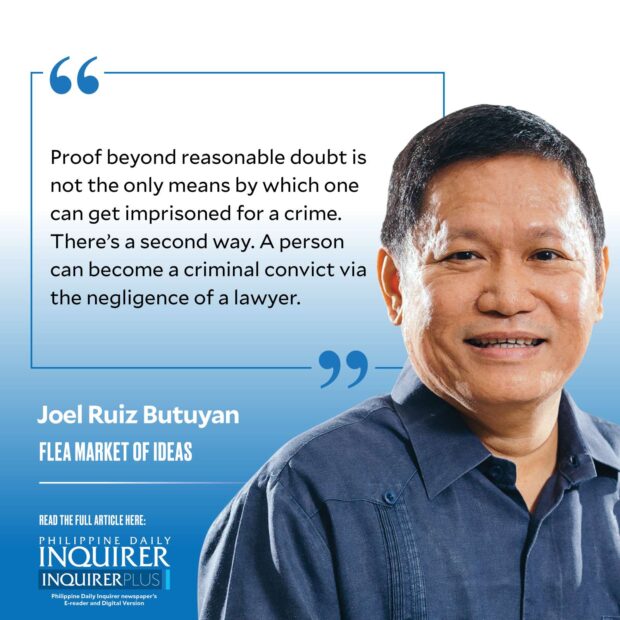
One of the most important rules that’s bannered as proof of our being part of civilized society is our adherence to the principle that no person can be imprisoned for any crime in our country, unless his/her guilt is proven beyond reasonable doubt. It’s the de facto Eleventh Commandment.
It turns out it’s a lie. Proof beyond reasonable doubt is not the only means by which one can get imprisoned for a crime. There’s a second way. A person can become a criminal convict via the negligence of a lawyer.
This has been demonstrated by the sad fate suffered by the late Dr. Benigno “Iggy” Agbayani Jr. who died in prison after being convicted of a crime he consistently protested he did not commit even while he was already in prison.Agbayani was an orthopedic doctor who performed a knee operation on a patient, lawyer Saul Hofileña Jr. The patient alleged that he suffered an infection on his operated knee which incapacitated him from working for 30 days and that required another operation on his wrist as he was forced to walk with a cane for a prolonged period of time. Hofileña filed a criminal case for reckless imprudence resulting in serious physical injuries against Agbayani.
The Metropolitan Trial Court (MTC) rendered a decision convicting Agbayani. The doctor appealed to the Regional Trial Court (RTC), but the RTC dismissed his appeal because of his lawyer’s failure to submit an appeal memorandum. Agbayani made a second appeal to the Court of Appeals (CA), but the CA dismissed the appeal because of his lawyer’s failure to attach supporting documents to the appeal petition. Agbayani made a third appeal to the Supreme Court (SC), but the SC denied his appeal by affirming the CA decision.
Agbayani could have waived his right to appeal by accepting the MTC decision and by applying for probation, and he would not have spent a day in prison. But by conceding criminal liability, his medical license (perhaps his only means of livelihood) could have been administratively canceled. It was probably for this reason, plus he earnestly believed in his innocence, that he opted to appeal. He lost his appeal three times, not because of the lack of merit of his defense, but because of the cold application of technical rules over which he knew nothing about and which were the sole responsibility of his lawyer.
Agbayani was therefore convicted, not because of proof beyond reasonable doubt of his guilt, but because of the negligence of his lawyer. True, there was the decision of conviction by the MTC, but it was the triple decisions of three appellate courts—RTC, CA, and SC—which all applied technical rules that led to his final conviction and which caused his imprisonment.
Wearing my lawyer’s hat, the SC must reexamine the policy of making clients suffer for their lawyers’ negligence. A distinction should be made between noncompliance with substantive laws and noncompliance with technical rules. Clients should correctly suffer the consequences of their cases’ noncompliance with substantive laws because this means the lack of merit of their complaint or defense. But clients should not suffer their lawyers’ noncompliance with technical rules because clients know nothing about these rules. It should be lawyers who should suffer the consequences for procedural lapses because they are the ones responsible for these violations. The correct solution should be for our courts to impose the payment of hefty fines for lawyers who violate procedural rules. Making clients lose life, liberty, or property for reasons not attributable to them smacks of unconstitutionality and even amounts to an uncivilized judicial tradition.
Wearing my journalist’s hat, our judges and justices should engage in serious self-reflection. Our jurists heartlessly apply technical rules on citizen-litigants, but aren’t they themselves guilty of often violating technical rules? One case in point—our Constitution gives the maximum periods for our courts to decide: 24 months for the SC; 12 months for the CA and; three months for the RTC and MTC. Ask lawyers and litigants and they will sing in protest that many courts—the SC included—violate these constitutional rules. Can our courts blame litigants and trial lawyers if they view this double standard as judicial hypocrisy?
Wearing my ordinary citizen’s hat, I find the utter lack of common sense in the rule of making clients suffer the negligence of their lawyers because of this: if Agbayani was correctly made to suffer the negligence of his lawyer, applying the same principle, shouldn’t Hofileña likewise be made to correctly suffer the negligence of his doctor? So much for the principle of equal protection of the law.
Supreme Court Chief Justice Alexander Gesmundo declared that the SC will look into the case of Agbayani to probe “lapses.” The high court should reexamine the blind worship and the unwitting elevation of procedural rules as superior judicial god. The SC must reinstate and uphold the supremacy of the gods of justice, fairness, and common sense.
—————
Comments to fleamarketofideas@gmail.com

